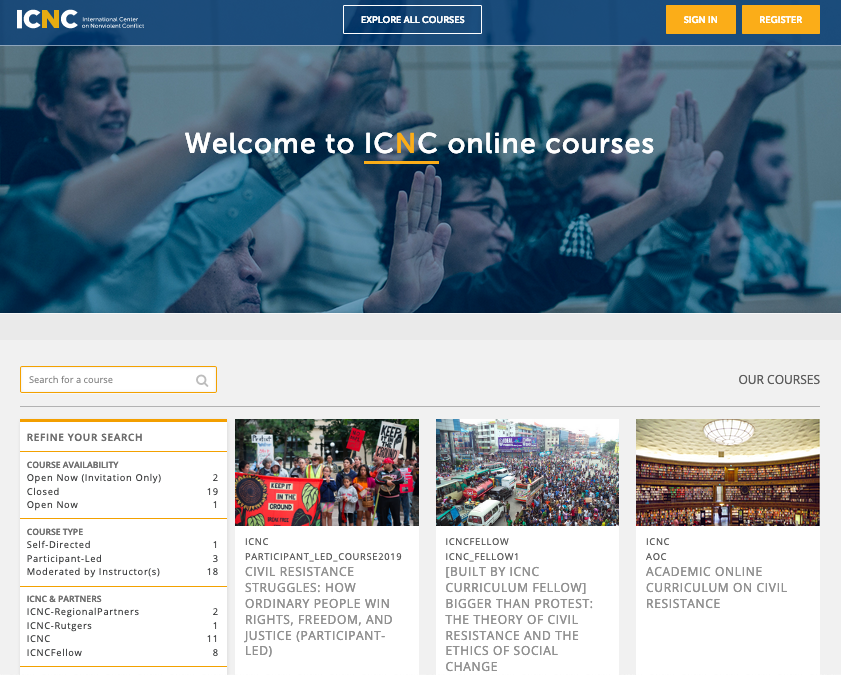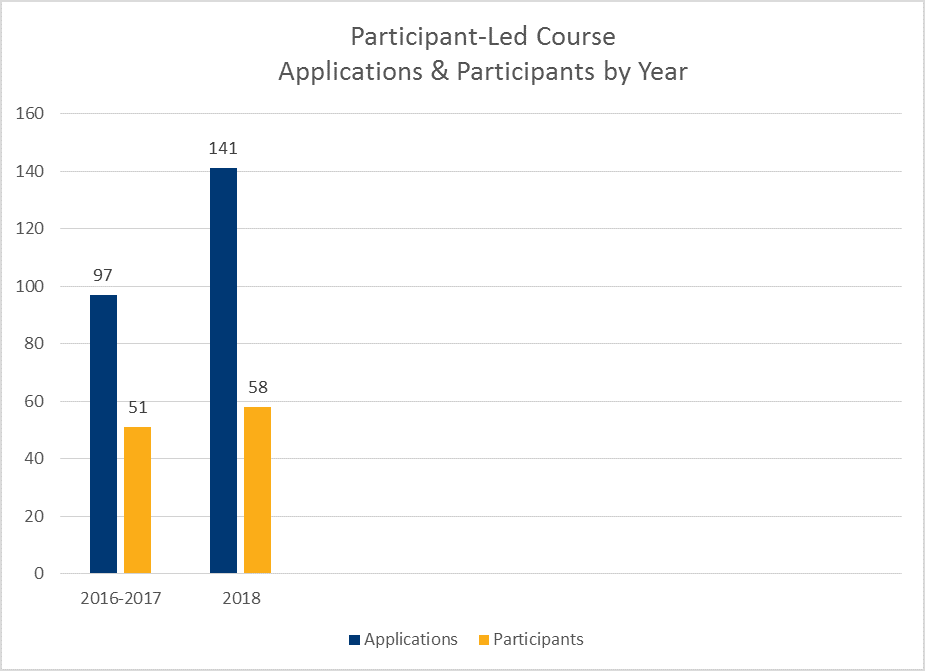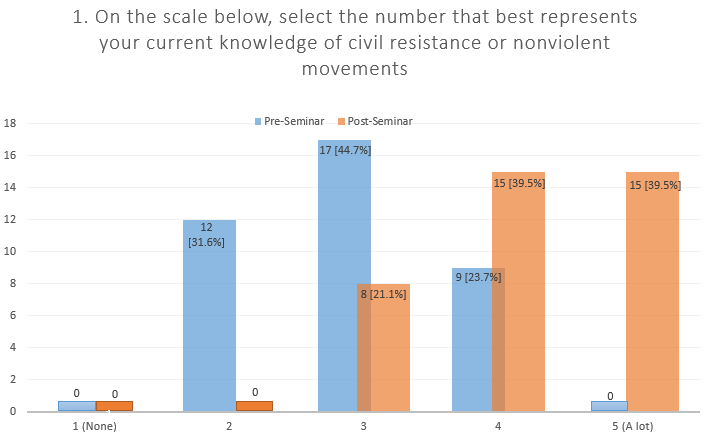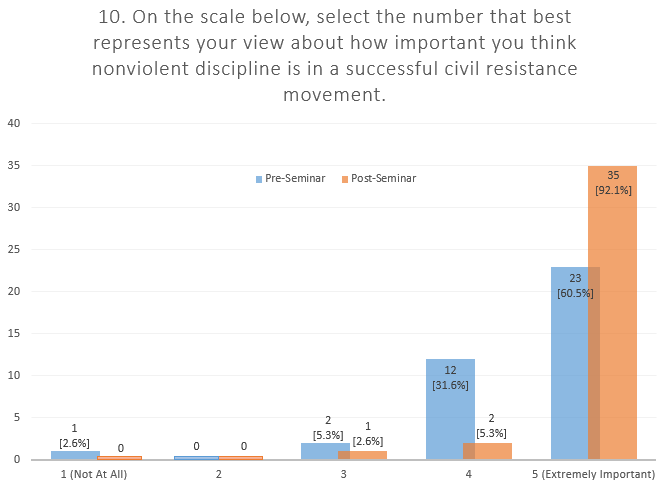Minds of the Movement
An ICNC blog on the people and power of civil resistance
by Maciej BartkowskiFebruary 13, 2019
There are many opportunities for structured online learning about civil resistance these days.
 The International Center on Nonviolent Conflict (ICNC) offers online courses and we recently launched our new course platform. The United States Institutes of Peace also offers a wide variety of online courses on nonviolent action, and more online learning options in this field are available through other institutions around the world.
The International Center on Nonviolent Conflict (ICNC) offers online courses and we recently launched our new course platform. The United States Institutes of Peace also offers a wide variety of online courses on nonviolent action, and more online learning options in this field are available through other institutions around the world.
With the growth of these online courses comes the challenge of measuring and assessing their impact. To this end, ICNC developed and conducts different surveys to evaluate its online courses that may serve as a useful template to others. This blog post shares the instruments we use to measure the impact of online education and the real changes we can discern from this work.
 In 2012, we began offering our moderated online course People Power: The Study of Strategic Nonviolent Resistance in partnership with the International Institute for Peace at Rutgers University Graduate School. The course is taught and facilitated by ICNC staff together with members of the ICNC Academic Council. Over the last seven years, 870 people submitted applications to participate, and over 370 were admitted. The course draws participants from close to 30 countries on average, representing various professional groups including activists and organizers, NGO staff, academics, educators, journalists, and government and policy professionals. Most have experience participating in or organizing nonviolent campaigns and come to the course with the goal of sharing their on-the-ground practical experience and learning from others.
In 2012, we began offering our moderated online course People Power: The Study of Strategic Nonviolent Resistance in partnership with the International Institute for Peace at Rutgers University Graduate School. The course is taught and facilitated by ICNC staff together with members of the ICNC Academic Council. Over the last seven years, 870 people submitted applications to participate, and over 370 were admitted. The course draws participants from close to 30 countries on average, representing various professional groups including activists and organizers, NGO staff, academics, educators, journalists, and government and policy professionals. Most have experience participating in or organizing nonviolent campaigns and come to the course with the goal of sharing their on-the-ground practical experience and learning from others.
 Two years ago, we launched a new type of online course, a participant-led (unmoderated) course called Civil Resistance Struggles: How Ordinary People Win Rights, Freedom, and Justice. Built around the unique concept of a self-learning online community, course participants take the initiative to review pre-set content and interact with each other on various topics, issues, and questions related to civil resistance. Over two iterations from 2016-2018, we received 238 applications and 109 people were admitted and participated in the course. Similar to our moderated course, our participant-led online course has drawn participants from close to 30 countries with a similar array of backgrounds and learning goals as participants of the People Power course.
Two years ago, we launched a new type of online course, a participant-led (unmoderated) course called Civil Resistance Struggles: How Ordinary People Win Rights, Freedom, and Justice. Built around the unique concept of a self-learning online community, course participants take the initiative to review pre-set content and interact with each other on various topics, issues, and questions related to civil resistance. Over two iterations from 2016-2018, we received 238 applications and 109 people were admitted and participated in the course. Similar to our moderated course, our participant-led online course has drawn participants from close to 30 countries with a similar array of backgrounds and learning goals as participants of the People Power course.
In these courses and our other educational initiatives, we have two common aims:
- to provide people with the most accurate and up-to-date information we can about civil resistance, based in social science and the insights of seasoned practitioners;
- to create a positive learning community so that participants can connect with and learn from each other.
We have developed three types of instruments over the years to evaluate course impact:
- learning gains surveys consisting of a pre-seminar learning gains survey (distributed prior to the start of the course) and a post-seminar learning gains survey;
- final course evaluation;
- our newest addition, a three-month follow-up survey.
These evaluation instruments measured the impact of two of our online courses, a 2017 moderated online course and a 2018 participant-led online course. The key findings are highlighted below:
Significant knowledge gains
 In the final evaluations distributed soon after the courses ended, 97% of respondents in the moderated online course and 96% in the participant-led online course indicated that they had now more knowledge about civil resistance than they had before taking the course. The pre- and post-seminar surveys, in turn, showed that knowledge gains on civil resistance among respondents by the end of the moderated and participant-led courses were, respectively, 3 to 3.5 times greater in comparison with their declared knowledge at the beginning of the courses.
In the final evaluations distributed soon after the courses ended, 97% of respondents in the moderated online course and 96% in the participant-led online course indicated that they had now more knowledge about civil resistance than they had before taking the course. The pre- and post-seminar surveys, in turn, showed that knowledge gains on civil resistance among respondents by the end of the moderated and participant-led courses were, respectively, 3 to 3.5 times greater in comparison with their declared knowledge at the beginning of the courses.
By the end of the  courses, a majority of participants more readily recognized the importance of the core attributes of successful civil resistance campaigns such as strategic planning, participation, and nonviolent discipline. For example, slightly more than 91% of respondents (at the end of the participant-led course) and 92% (at the end of the moderated online course) thought that nonviolent discipline was extremely important in civil resistance struggles, up by almost one-third from the start of the courses.
courses, a majority of participants more readily recognized the importance of the core attributes of successful civil resistance campaigns such as strategic planning, participation, and nonviolent discipline. For example, slightly more than 91% of respondents (at the end of the participant-led course) and 92% (at the end of the moderated online course) thought that nonviolent discipline was extremely important in civil resistance struggles, up by almost one-third from the start of the courses.
Direct applicability, increased effectiveness, and relevance
Our three-month follow-up survey for the ICNC-moderated online course revealed that almost three-fourths of respondents who engaged in nonviolent actions had used what they learned from the course in planning nonviolent resistance campaigns. In  the participant-led course, nearly half of all respondents said their campaign planning and organizing had been much more effective because of the course. Half of the respondents from the moderated online course thought that the course remained valuable for them three months down the road, while more than a quarter of respondents said it was even more relevant and valuable to them at that point than immediately after the course. This number was almost twice as high (close to 44% respondents) in the participant-led course.
the participant-led course, nearly half of all respondents said their campaign planning and organizing had been much more effective because of the course. Half of the respondents from the moderated online course thought that the course remained valuable for them three months down the road, while more than a quarter of respondents said it was even more relevant and valuable to them at that point than immediately after the course. This number was almost twice as high (close to 44% respondents) in the participant-led course.
Increased engagement
As stated, the goal of our online courses is to provide empirical and factual information and to foster a learning community. We do not advise people about if or how to undertake civil resistance in their particular context. However, we are finding that an impact of our courses is that people are increasing their engagement in civil resistance. For example, three months after the end of the courses, almost two-thirds of respondents in the moderated course said that their engagement in civil resistance had increased through practice, education, and news analysis. Meanwhile, none of the survey respondents reported that their engagement had decreased.
 In the participant-led course, more than 88% of respondents said that their current engagement with civil resistance had increased from prior to the course, while none of the respondents reported that their individual engagement with civil resistance decreased. Also, 13% more respondents from the participant-led online course gained confidence to join civil resistance actions, while the number of participants who initially reported that they were not comfortable with participating in civil resistance (around 14%) dropped to none. All respondents from the participant-led course and more than 70% from the moderated online course noted three months after the end of the course that they became in fact more interested in learning about civil resistance.
In the participant-led course, more than 88% of respondents said that their current engagement with civil resistance had increased from prior to the course, while none of the respondents reported that their individual engagement with civil resistance decreased. Also, 13% more respondents from the participant-led online course gained confidence to join civil resistance actions, while the number of participants who initially reported that they were not comfortable with participating in civil resistance (around 14%) dropped to none. All respondents from the participant-led course and more than 70% from the moderated online course noted three months after the end of the course that they became in fact more interested in learning about civil resistance.
These evaluations show a remarkable impact on online learners. We are now working to expand our online education offerings to include new self-paced courses on civil resistance—which anyone with an internet connection will be able to take for free, anywhere, anytime. These new and existing ICNC online courses aim to meet growing demand from people around the world who want to reinforce their agency for human rights, justice, and democratic rule of law with new knowledge, better skills, and appropriate tools.
Meanwhile, we continue refining evaluation instruments for our online teaching, focusing on five areas:
- learner knowledge gains relevant to civil resistance;
- acquisition of new skills;
- applicability and relevance of our online teaching to participants’ professional activities;
- efficacy gains when practitioners choose to apply knowledge and insights from the course to their activities; and
- attitudinal change in learner comfort level in speaking, teaching about or participating in civil resistance actions as a result of our courses.
Our newly updated 2019 evaluation templates attempt to capture the above. We welcome others to review, adopt, and further refine these instruments in light of their own learning objectives, target audience, and teachable content:
Links to relevant statistics in this piece can be found here: Participant-led online course and Moderated online course.

Maciej Bartkowski
Dr. Maciej Bartkowski is a Senior Advisor to ICNC. He works on academic programs to support teaching, research and study on civil resistance. He is a series editor of the ICNC Monographs and ICNC Special Reports, and book editor of Recovering Nonviolent History. You can follow him @macbartkow